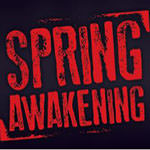





 Principals
The Children:
Melchior Gabor
Wendla Bergmann
Moritz Stiefel
Ilse Neumann
Hänschen Rilow
Martha Bessel
Ernst Röbel
Georg Zirschnitz
Otto Lämmermeier
Thea
Anna
Greta Brandenburg
The Adults:
Frau Bergmann
Fanny Gabor
Frau Bessell
Fräulein Großebüstenhalter
Fräulein Knuppeldick
Headmaster Knochenbruch
Herr Sonnenstich
Herr Gabor
Herr Stiefel
Herr Rilow
Herr Neumann
Father Kaulbach
Doctor von Brausepulver
Schmidt: the abortionist.
Principals
The Children:
Melchior Gabor
Wendla Bergmann
Moritz Stiefel
Ilse Neumann
Hänschen Rilow
Martha Bessel
Ernst Röbel
Georg Zirschnitz
Otto Lämmermeier
Thea
Anna
Greta Brandenburg
The Adults:
Frau Bergmann
Fanny Gabor
Frau Bessell
Fräulein Großebüstenhalter
Fräulein Knuppeldick
Headmaster Knochenbruch
Herr Sonnenstich
Herr Gabor
Herr Stiefel
Herr Rilow
Herr Neumann
Father Kaulbach
Doctor von Brausepulver
Schmidt: the abortionist.
Click on image for gallery and see extra photos in right hand side gallery.
Eleven teenagers in the world of 19th century Germany kept in ignorance of their own sexuality, its meaning and its consequences, held down by a repressive educational system and the inability of their parents, teachers and pastors to help them properly contextualise any of it-this is what Frank Wedekind’s bold and controversial 1891 play , The Awakening of Spring, is about. Spring Awakening , the equally bold musical by Steven Slater and Duncan Sheik based on the Wedekind play, tackles those issues, adds even a few more , and brings all of them to life in a journey that reaches squarely into the 21st century. After a progression of workshops , rewrites and off-Broadway previews , the finished Slater/Sheik production premiered at the Eugene O’Neill Theatre on December 10, 2006, directed by Michael Mayer and choreographed by the dance visionary , Bill T. Jones . The musical won eight Tony Awards, four Drama Desk Awards and a Grammy for its cast album. Clearly something about this adaptation’s incongruous admixture of 1890s Prussian oppression, rock-‘n’-roll teen angst , minimalism , Buddhism, and modern dance choreography “clicked”.
Synopsis
Wendla Bergmann, an adolescent in late-nineteenth-century Germany, laments that her mother gave her “no way to handle things” and has not taught her the lessons she is meant to know as a young woman. She tells her mother that it is time she learned where babies come from, considering that she is about to be an aunt for the second time. Her mother cannot bring herself to explain the facts about conception clearly to Wendla, despite knowing her daughter is reaching puberty. Instead, she simply tells Wendla that to conceive a child a woman must love her husband with all of her heart. The other young girls in town—Martha, Thea, Anna and Ilse—appear to be similarly naïve and are upset about the lack of knowledge presented to them. At school, some teenage boys are studying Virgil in Latin class. When Moritz Stiefel, a very nervous and anxious young man, sleepily misquotes a line, the teacher chastises him harshly. Moritz’s classmate, the rebellious and highly intelligent Melchior Gabor, tries to defend him, but the teacher will have none of it, and hits Melchior with a stick. Melchior reflects on the shallow narrow-mindedness of school and society and expresses his intent to change things . Moritz describes a dream that has been keeping him up at night, and Melchior realises that Moritz has been having erotic dreams which Moritz believes are signs of insanity. To comfort the panicked Moritz, Melchior, who has learned sexual information from books, tells Moritz that all of the boys at their age get these dreams. Moritz, Melchior and the other boys-Ernst, Hänschen, Otto and Georg-share their own sexually frustrated thoughts and desires .Moritz, who is not comfortable talking about the subject with Melchior, requests that he give him the information in the form of an essay, complete with illustrations. All the girls, save Ilse, are gathered together after school and tease each other as they fantasise about marrying the boys in the town. Martha admits that she has a crush on Moritz, but is made fun of by the other girls. At the top of the list is the radical, intelligent, and good-looking Melchior . Moritz has eagerly digested the essay that Melchior prepared for him, but complains that his new knowledge has only made his dreams even more vivid and torturous. Melchior tries to calm and comfort his friend, but Moritz runs off in frustration. All of the boys and girls express their desires for physical intimacy. Searching for flowers for her mother, Wendla stumbles upon Melchior. The two reminisce on the friendship they once shared as children and share a moment while sitting together in front of a tree. Each of them considers what it would be like to give in to their physical desires for one another but they do not do so. Meanwhile, at school, Moritz sneaks a look at his test results and is thrilled to learn that he has passed his midterm examinations, and tells the other boys. They are ecstatic, save the skeptical Hänschen. However, the teacher and schoolmaster, who claim they cannot pass everyone, decide to fail Moritz anyway, deeming his passing grade still not up to the school's lofty standards. Martha accidentally admits to her friends that her father abuses her physically (including sexual abuse) and that her mother is either oblivious or uncaring. The other girls are horrified to hear this, but Martha makes them promise not to tell anyone, lest she end up like Ilse, a friend from childhood who now wanders homeless and aimless after her similarly abusive parents kicked her out of the house .Later, Wendla finds Melchior again at his spot in the woods and tells him about Martha's abuse. Melchior is appalled to hear this, but Wendla convinces him to hit her with a switch, so that she can try to understand Martha’s pain. At first Melchior is determined to do nothing of the sort, but reluctantly complies. He gets carried away in the beating, taking his own frustrations out on Wendla and throws her to the ground. Disgusted with himself, Melchior runs off as Wendla is left lying on the ground, weeping. Alone, Wendla finds that Melchior has left his journal on the ground. She picks it up and takes it with her. Moritz is told he has failed his final examination, and his father reacts with disdain and contempt when Moritz tells him that he will not progress in school. Rather than attempting to understand his son's pain, Moritz's father is only concerned with how the others in town will react when they see "the man with the son who failed." Moritz writes to Melchior’s mother, his only adult friend, asking for money to help him flee to America; she tenderly but firmly denies his request and promises to write his parents to discourage them from being too hard on him. Devastated by her refusal, and feeling he has few choices left, Moritz contemplates suicide. In a stuffy hayloft during a storm, Melchior expresses his frustration about being caught between childhood and adulthood. Wendla finds him once again, telling him she wants to return his journal, and each apologizes for what happened in the forest. Before long, they begin to kiss. Wendla resists his advances at first–she doesn't really understand what's going on between them and is reluctant to partake–sensing that what they are doing is something very powerful, unlike anything that she has known before. As Melchior becomes more insistent, he overpowers her objections with a combination of affection and sheer force. They continue, and they have sex in the hayloft. At the very moment Melchior commits the act, Wendla cries out against it, and the darkness falls. (Note: This scene was slightly softened from the show's Off-Broadway run, when the act as a rape without Wendla's consent was more straightforward. Later, Wendla still objects to Melchior, but gives in without understanding what he is actually trying to do, leaving the question of consent still ambiguous on many levels.
Wendla and Melchior are finishing their moment of confused intimacy in the hayloft; they reflect on and discuss what has just happened . Moritz, having been thrown out of his home, wanders the town at dusk, carrying a pistol when he comes across Ilse, a childhood friend of his. Ilse, whom it is implied has a crush on Moritz, tells him she has found refuge at an artists' colony, and they reminisce in some childhood memories and "remarkable times". She invites him to come home with her and join her in sharing some more childhood memories, and maybe something more. Moritz refuses and Ilse does everything she can to change his mind. After affirming to Ilse that he truly wished he could go with her, Moritz refuses and Ilse leaves–distraught and upset. Realising that Ilse was his last chance to escape the fate he's set out for himself, Moritz quickly changes his mind and calls after her, but it is too late–she is gone. Alone and believing that he has nowhere to turn, Moritz shoots himself. At Moritz's funeral, each of the children drops a flower into his grave as Melchior laments the passing of his friend while touching on the factors that led to his death, including Moritz's treatment by his parents. Back at school, the schoolmaster and teacher feel the need to call attention away from Moritz, whose death was a direct result of their actions. They search through Moritz's belongings and find the essay on sex which Melchior wrote for him. They seize the opportunity to lay the blame of Moritz's death on Melchior, and although Melchior knows that he is not to blame, he knows there is nothing he can do to fight them and is expelled as a result. Elsewhere that night, Hänschen meets up with his shy and delicate classmate Ernst. Ernst tells Hänschen about his plans to become a pastor after school, and Hänschen shares his pragmatic outlook on life. He is amazed with how Ernst has remained so innocent despite the horrible things happening around them. Hänschen then seduces Ernst, who realises that he loves Hänschen, despite the fact that Hänschen is unable to reciprocate the sentiment vocally. Wendla has become ill, and her mother takes her to visit a doctor. He gives her some medication and assures them both that Wendla is suffering from anaemia and will be fine, but takes Wendla's mother aside and tells her that Wendla is pregnant. When her mother confronts her with this information, Wendla is completely shocked, not understanding how it could have happened. She realizes that her mother lied to her about how babies are made. Although she berates her mother for leaving her ignorant, her mother rejects the guilt and insists Wendla tell her who the child's father is. Wendla reluctantly surrenders a passionate note Melchior sent her after they consummated their relationship. She reflects somberly on her current condition and the circumstances that precipitated it, but resolves with optimism about her future child .Meanwhile, Melchior's parents argue about their son's fate; his mother does not believe that the essay he wrote for Moritz is sufficient reason to send him away to reform school. When Melchior's father tells his wife about Wendla's pregnancy, she finally agrees that they must send Melchior away, which they do without telling him that Wendla is pregnant. During this time, Melchior and Wendla keep contact through letters, delivered by Ilse. At the reform school, Melchior gets into a fight with some boys who grab a letter he has just received from Wendla and use it in a masturbation game. As one of the boys reads from the letter, Melchior finally learns about Wendla and their child, and he escapes from the institution to find her. When Melchior reaches town, he sends a message to Ilse, asking her to have Wendla to meet him at the cemetery at midnight. Ilse, however, can take no action as Melchior "hasn't heard" about Wendla, and shows Anna, Martha, and Thea the letter. They are equally horrified, and they decide not to tell Melchior what has happened. At the cemetery, Melchior stumbles across Moritz's grave and swears to himself that he and Wendla will raise their child in a compassionate and open environment. When Wendla is late to the meeting, Melchior begins to feel a little uneasy. Looking around, Melchior sees a grave he hadn't noticed before. He reads the name on the stone–Wendla's–and realises that Wendla has died from anaemia after a botched abortion. Overwhelmed by shock and grief, he takes out a razor with intent to kill himself. Moritz's and Wendla's spirits rise from their graves to offer him strength. They persuade him to journey on, and he resolves to live and to carry their memories with him forever. Led by Ilse, everyone assembles onstage now (in some stagings, in modern dress) to sing about how although the adults may still call the shots with their upright, conservative views, they won't last forever, and the seeds are already being planted for a new, liberal minded, progressive generation.